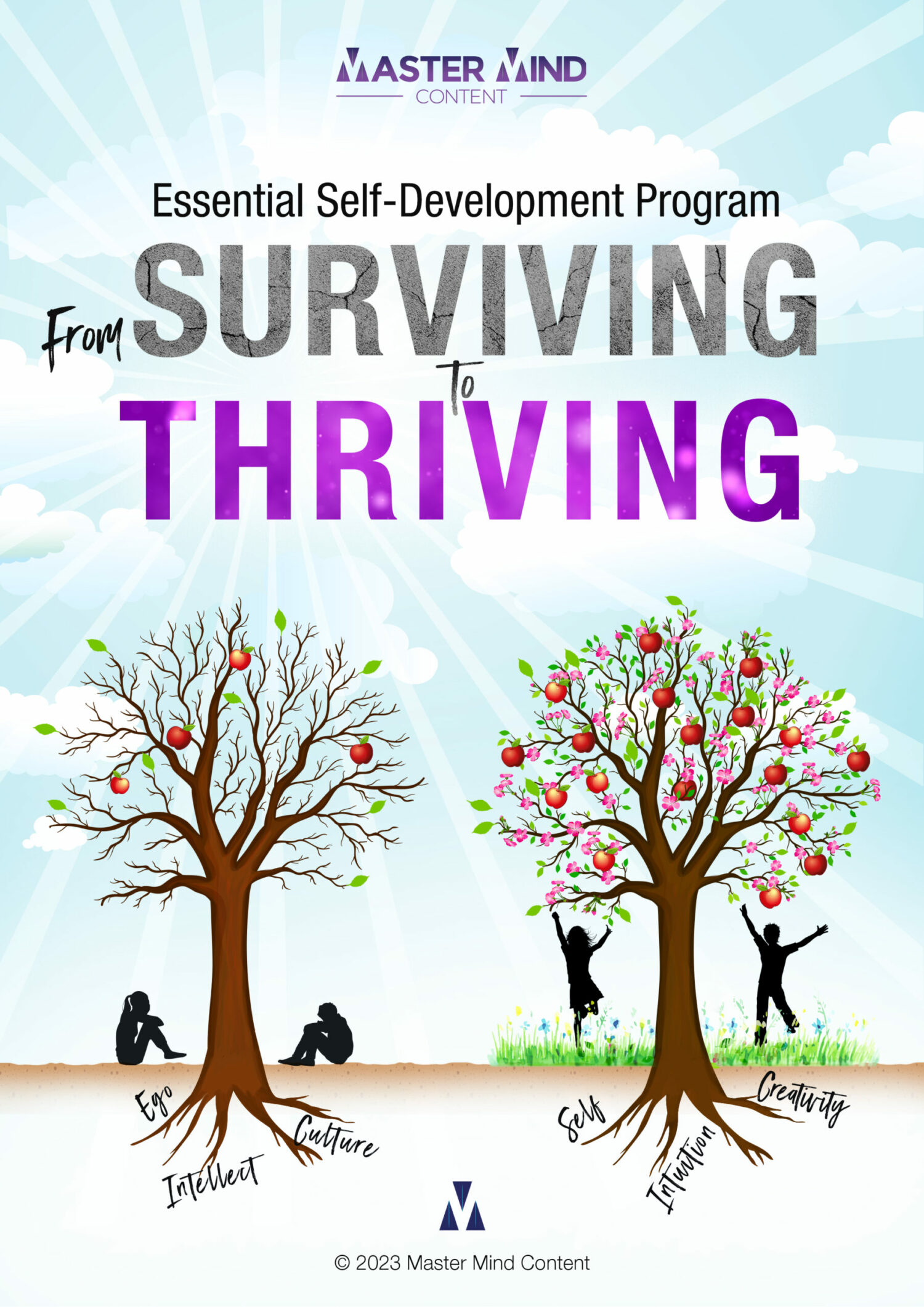
Clinical research shows that abandonment issues are a significant contributor to anxiety and depression. If you were abandoned physically or emotionally as a child, the chances are that abandonment issues are an underlying demon lurking behind your anxiety and depression.
Trust issues and feeling insecure in relationships are also outcrops of abandonment. A surefire way to identify whether you have abandonment issues, however, is if you’re in a toxic relationship but you are too afraid to end it. [1]
That is a fear of abandonment staring you right in the face!
You can also abandon yourself. If you don’t trust yourself, or repress parts of your personality that you believe are not acceptable, you’re abandoning your True Self and pushing aspects of your personality into the shadow. [2]

You also abandon yourself by adopting other people’s preferences, beliefs and ideas just to fit in. This is something I was guilty of as a teenager. I was emotionally abandoned by my parents and my sibling sister.
The reason why individuals with abandonment issues adopt this type of behaviour is because they have a desperate need to fit in. To feel as though you belong to part of a group. You want to feel accepted and appreciated.
If you have abandonment issues, you may also notice that you attach too quickly in a relationship and want your declaration of love to be reciprocated by your partner early in the relationship.
You are probably also a people-pleaser, doing things for other people because you want to be liked and accepted. In intimate relationships, you will go out of your way to make the other person happy even at your own expense — such as staying in a toxic relationship because you don’t want to hurt the other person. Or at least that’s what you tell yourself.
Comfort, compassion and understanding are basic human needs that instil emotional security and psychological stability in children. Without this emotional support, children learn to repress the parts of their personalities that are deemed unworthy.
In the Master Mind Content archetypes tool, you will notice that many of the emotional issues experienced by people with abandonment issues show up in the wounded categories for the Everyman and the Creator. Both these archetypes are associated with the Greek god Hephaestus.
Hephaestus is born with a deformity and subsequently dismissed from Olympus by his parents. Hera did not think her lame son was fit to be a god. This was the first time he was abandoned.

This myth shows us that a deformity is not acceptable in the realm of supreme conscious awareness — of “civilised” beings. This is analogous to you behaving in a manner that is not acceptable to your parents or civilised society when you were a child.
But a child’s behaviour is merely instinctive. It is your animal nature. Men are considered animals, not gods. Only men who can control their animal nature can be considered a god, thus the deformed Hephaestus was not considered not fit to be a god,
In another myth, Hephaestus is dismissed by his father, Zeus for not siding with him during an argument. Zeus, the King of the Gods, is synonymous with the Supreme Self, the mind, both the conscious mind and the Superconscious.
This myth shows us how we can become separated from our True Nature when we do not obey the Self — Freud’s superego. As Jung shows, when the Self is repressed — ignored, forgotten, unheard — a complex develops.
A complex shows us that we are one-sided and imbalanced. In the two myths of Hephaestus, the deformed god can be viewed as an imbalance.
According to attachment theory, my psychological development aligned with both anxious-ambivalent attachment and anxious-avoidant attachment.
Abandonment issues usually develop in children who are disciplined for expressing emotions that are considered “unacceptable behaviour”. Subsequently, you learn to repress your emotions.

Children who are dismissed and/or ridiculed by their parents instead of receiving emotional support can also feel abandoned by their parents.
Other symptoms that are prominent in people with abandonment issues are feelings of rejection, loss, and hopelessness. When someone experiences abandonment, it can lead to a sense of disconnection from yourself and isolation from others.
In some cases, the fear of abandonment can become a pervasive and debilitating anxiety. This is observable in individuals who withdraw from relationships or avoid emotional intimacy altogether.
However, isolation and lack of support typically exacerbate feelings of depression which debilitates the individual even more. If you fall into the pit of depression, you lose the energy and inclination to engage with life altogether. Subsequently, your social life and career suffer.
Individuals who show symptoms of abandonment usually engage in negative self-talk. You may also harbour beliefs that you are not worthy of love or attention. These beliefs can be conscious or unconscious.

Such negative beliefs generally contribute to low self-esteem and feelings of guilt and shame. Ultimately, these symptoms lead to increased levels of anxiety and depression.
Abandonment issues can occur as a result of a variety of experiences or circumstances. The following list is the most common causes of abandonment issues:
Abandonment issues can stem from childhood experiences, such as neglect, and physical or emotional abuse. The loss of a parent [2] through divorce, death, or separation has been linked with abandonment issues.
Children who experience separation because the primary caregiver (usually the mother) is physically or emotionally absent, can feel rejected and unlovable. Likewise, if interactions with the primary caregiver are negative or unpredictable, life becomes too stressful.
To cope, the brain devises mechanisms such as disassociation and avoidance tactics. If negative emotions are unregulated, feelings of abandonment persist into adulthood and can affect your relationships and sense of well-being.
Children who are abandoned feel betrayed. They grow up believing that nobody loves them and the world is a lonely place to be. Feelings of betrayal become a lack of trust, martyrdom and a victim mentality emerges.
When this happens, you typically overstretch yourself by doing things for others. You do this because you want to be liked. But eventually, taking on other people’s burdens gets too much and resentment kicks in.

When you feel betrayed, you may also feel humiliated. Individuals with an underdeveloped psyche will seek revenge on the people they feel have betrayed them. They do this in various ways, either by trying to humiliate them or hurt them physically or emotionally.
Traumatic experiences, such as sexual assault, domestic violence, war, or displacement can cause feelings of abandonment. The result is a lack of trust in your caregivers and authority in general which surfaces as feelings of betrayal and disconnection from others in later life.
Experiencing rejection, whether it be in romantic relationships, your peers, siblings, parents, or other social groups, can trigger feelings of inadequacy. Here we see the roots of a lack of self-worth and feelings that you are not loveable start to grow.
Individuals who do not feel they fit in with their peers or social groups typically develop feelings of abandonment and rejection. An underlying condition develops that unconsciously informs you “I do not belong here.”

When individuals lack a sense of belonging they tend to become socially isolated and struggle to connect with others on a meaningful level. This gives rise to loneliness and a fear of rejection [3]. The need to belong is a core psychological need.
Moreover, the “need to belong” has been observed at both the neural and peripheral biological levels [4]. Subsequently, belonging-related stressors intensify and you become defensive to protect your emotional wellbeing – which accounts for irrational responses such as moodiness, outbursts of emotion and a tendency to try and humiliate others.
Unless creative types are in an environment where their imagination is appreciated, it can be very easy for individuals to develop a sense of not belonging.
As a creative introvert, I didn’t feel as though I fitted in with my peers. Because I went along with what they liked to do even though I didn’t, I abandoned myself. When I did start to find things that interested me, my friends ridiculed me for being different.
Major life transitions, such as moving to a new city, changing jobs, or ending a relationship, can trigger feelings of uncertainty about the future. If you already have abandonment issues from one of the causes mentioned above, these feelings can persist and cause you to become paranoid.
Paranoia can lead to a lack of trust, anxiety and fear. You may start withdrawing from society altogether and isolate yourself from others. The more isolated you become, the more you damage your mental health.

Abandonment issues can seriously interfere with your happiness in life. How you experience the world is largely influenced by your subconscious programs.
If your subconscious is ‘Nobody loves me, I am not wanted’ you will manifest loneliness, resentment, frustration and feelings of hopelessness.
It’s important to note that not everyone who experiences these circumstances will develop abandonment issues. And not all abandonment issues manifest in the same way.
The development of abandonment issues typically emerges from individual coping mechanisms [5] that were designed to help you handle stressful periods of your life.
Once you are aware that you have abandonment issues and how your past conditioned your current experiences, you are one step closer to healing abandonment issues.
Learning how to heal abandonment issues is just one of the psychic wounds we teach you how to transform in the Master Mind Content Essential Self-Development Program.
Seeking professional help can be an important step in addressing abandonment issues and developing subconscious programs that optimise your mental health and enable you to nurture constructive and loving relationships.

If you are already enrolled in the Master Mind Content Essential Self-Development Program, head over to the VIP Members Section and learn How To Heal Abandonment.
If abandonment issues are wreaking havoc in your life, lean how to heal abandonment in the Master Mind Content Essential Self-Development Program.
[1] Understanding Abandonment Issues
[2] https://www.thesap.org.uk/articles-on-jungian-psychology-2/about-analysis-and-therapy/the-shadow/
[5] Blackhart et al, 2007; Kross et al., 2007; Slavich et al., 2014; Slavich, Way et al. 2010
